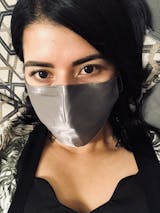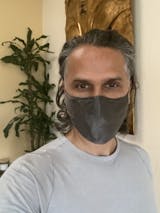You've got oily skin, so you avoid any oil-based skincare. You even avoid anything nourishing and hydrating for fear of your face becoming an oil slick by noon. But you might be interested in knowing that avoiding oily skincare may cause the oiliness—at least some of it, anyway.
This article will discuss who is prone to having oily skin, the science behind why our skin can sometimes feel oilier, products we should be avoiding, products we should be using, and how to maintain healthy, oily skin.
How Does Oil in Our Skin Get Produced
Let's do a quick science lesson on skin anatomy. Our skin is the largest organ in our body. Three layers make up our skin:
- The hypodermis (or subcutaneous layer) is the deepest layer composed of fat and connective tissue.
- The dermis, the middle layer, contains collagen and elastin, hair follicles, and sweat glands.
- The epidermis, the outer layer, comprises 4-5 sublayers of tightly-packed cells responsible for the protection and the cell renewal cycle.
Our skin has seven functions, which are crucial to maintaining a healthy equilibrium within our body. These seven functions are:
- Barrier
- Protection
- Immunological
- Secretion
- Thermoregulation
- Sensitivity
- Absorption
Let's talk about the Secretion function. Our dermis contains our sebaceous glands, where oil and sebum are produced. The oil is then secreted through the follicles and out onto the skin's surface.
Our sebaceous glands produce oil to form a protective barrier on our skin's surface to protect against bacteria and fungus. It also provides the skin with lubrication, so the cells stay hydrated.
Although we often aim to cleanse all the oil off our skin, the oil is an essential function that our skin relies on as part of its protection mechanism. Without it, our skin would crack, be dry, and be prone to infection.
Who Is More Prone to Oily Skin?
Having oily skin is like having thick, curly hair. You don't like your curly hair when you're young because it's hard to manage. Products are expensive to tame the mane. You get hair everywhere, and it takes three times longer to get ready. But as you get older, you thank your lucky stars because all of your friends' hair is thinning out while your locks are still as luscious as ever.
Oily skin is the same. When you're young, makeup is expensive. By the end of the night, you're no longer wearing the makeup you spent 45 minutes applying, as it has slid straight off your oil-slicked skin. You spend your evenings blotting the oil from your face. Your friends purposely make their skin look dewy—*ahem* oily—using different products while you're thinking, "Here, take some of my oil!"
But as a woman closer to 40 who still gets mistaken for a 30-year-old, I can finally say that having oily skin has started to pay off. In another 20 years, I'll be even more grateful that my skin has maintained its "dewy" (oily) glow.
Something I always wondered before I studied skincare was, "Why do I have oily skin, and two of my siblings don't?"
The answer lies in your genetics. If one or both of your parents were prone to oily skin, you have a 50% chance or higher of also having oily skin. Genetics is not the only factor, though.
Hormones, particularly during our adolescent years, can also cause the skin to become excessively oily. Some people find that after puberty, their skin settles down. But most people who suffer from oily skin at any point in their life are usually more on the oiler side of the spectrum. It's not likely that you'd go from being oily to being dry — not without external interferences, such as medication.
Speaking of medications, this can be a pretty big reason why your skin has suddenly become oilier. Some contraceptive pills or hormone replacement drugs, in particular, are the usual culprits. See the correlation: hormones or hormonal medications can create an imbalance in the skin.
Other factors that can affect our skin are seasonal changes, working in air conditioning, using incorrect skincare or cosmetic products, and our diet.
What to do When You Have Oily Skin
When a person has oily skin, it usually means that they get an oily shine along their T-zone (forehead and nose). But sometimes, in extreme cases, they even get oily skin across the rest of their face, which is when it can become a real nuisance.
While you cannot change your skin type, there are things you can do to prevent skin from becoming excessively oily. Here are some tips:
Stopping Medication/Finding Alternative Medication
Stopping medication isn't always an option, so take this with a grain of salt. But if you are on medication that causes oilier skin, and there are alternative brands or formulations of your prescription, perhaps consider switching. As I said, this isn't always possible — but it could be.
Adjust Your Diet
Some experts say eating dairy, high-glycemic-index (G.I.) foods, and refined carbs, like white bread and pasta, can trigger the hormonal response in our skin, which, as mentioned earlier, can directly influence how oily our skin is. Also, processed sugars, fried foods, animal fats, and any greasy foods can make our body's insulin levels spike, increasing the oil and sebum produced.
Eating a diet rich in fresh, plant-based nutrients and cutting back on processed and fried foods is one way to help manage oily skin.
Avoid Air Conditioning
If you work or spend a lot of time in air conditioning, this could be wreaking havoc on your skin. Not only does air conditioning dehydrate our skin by drawing out moisture, but the dehydration can cause our sebaceous glands to react — or over-react — and start producing more oil.
Much like how our skin reacts when we over-cleanse, it's trying to protect our skin from drying out and becoming vulnerable to bacteria and infection. So what can you do?
Go outside every couple of hours to get some fresh air and weather on your skin. Or, if possible, turn the air conditioner off. Your bank account will also thank you.
Drink Plenty of Water
Drinking water goes hand-in-hand with the last two tips. Drinking plenty of water to complement your healthy eating and an air conditioner-free workplace will keep your cells hydrated and healthy, so your body and skin functions don't need to work as hard.
Using the Correct Skincare
You know that "squeaky clean" feeling after washing your face, where it feels tight? That means you've either over-cleansed or are using a product that is way too harsh. It has stripped everything away, destroying your skin's protective barrier, leaving nothing in its path of destruction.
Conventional brands often contain many synthetic ingredients — especially skincare for oily skin. Their goal is to remove all the oil quickly, often having harsh ingredients like sulfates and alcohol. If your cleanser is causing that tight, squeaky-clean feel, I suggest you stop using it. Maybe you can use it to wash your feet or something.
Instead, opt for an oil cleanser. A good quality oil-based cleanser won't strip the skin of its protective barrier. It also regulates the sebaceous glands within the dermis layer by nourishing and hydrating the follicles while melting makeup and debris off the skin's surface.
If you're nourishing and protecting the skin, it won't have any reason to overreact. See how that works?
My pick is M.S.Skincare's Silk Premier Cleansing Oil. It has only seven ingredients — all of them naturally derived. The star ingredients are Frankincense oil, which balances sebum, and Black Cumin, which clears congestion.
If you are wearing makeup and have decided to use an oil-based cleanser, you probably need to cleanse twice. The first oil cleanse removes your makeup, but the second cleanse is the one that cleans your skin.
Try M.S.Skincare's Mantra Skin Perfecting Cleanser. This gentle foaming cleanser contains ayurvedic herbs neem, turmeric, and holy basil, all known for their clarifying and brightening properties.
After cleansing twice, use a toner. Toners help balance your skin's pH, restore your acid mantle (barrier), and prepare your skin for other products. I love Bambu Earth's Rosemary Toner. It has just four gentle ingredients and feels zesty on the skin.
Follow with a serum, like Earth Harbor's Nebula Adaptogen Clarity Ampoule. It contains sea lavender and ginseng for regulating sebum and minimizing congestion, with antibacterial and antimicrobial properties. This serum also contains rose for brightening, perfect for oily and blemished skin.
Finish your regime with a hydrating but lightweight moisturizer. Earthwise Beauty's Ambrosia de Cerrado Lightweight Moisturizer is a beautiful combination of active herbs and botanicals that brighten and nourish skin without any greasy residue. With three unique ingredients wildcrafted from South America, this moisturizer gives skin an intense boost of antioxidants, vitamins, and phytonutrients essential to healthy skin.
Oily skin can be a nuisance to deal with. But the truth is, it's more beneficial to have oily skin in the long term. Our skin needs oil; there's no question about it. It keeps our cells hydrated, our skin barrier strong, and will keep your skin from aging quicker than those with dry skin. Instead of cursing our oily T-zones, let's embrace them with love and appreciation for why they truly exist.
Emma Masotti has been a trained esthetician for over 15 years. She is a sustainable skincare writer, educating and building awareness around proper skin health that doesn't cost the earth.
Some of the products promoted in our blog are from our online store. Many others are brands we have researched and found to be great examples of sustainable, ethical, and innovative brands in their field, and we don't profit from mentioning them in our blog. #CollaborationOverCompetition










